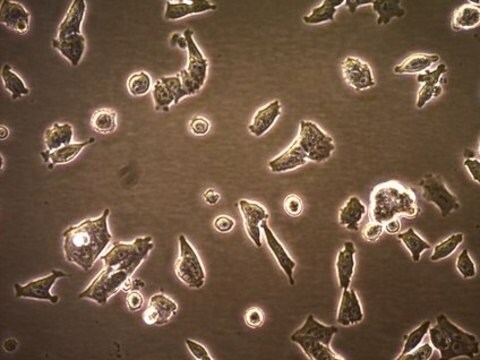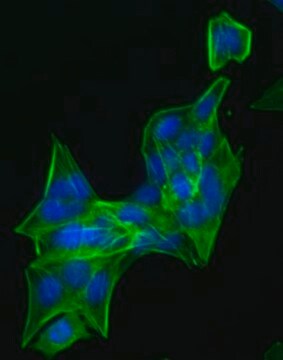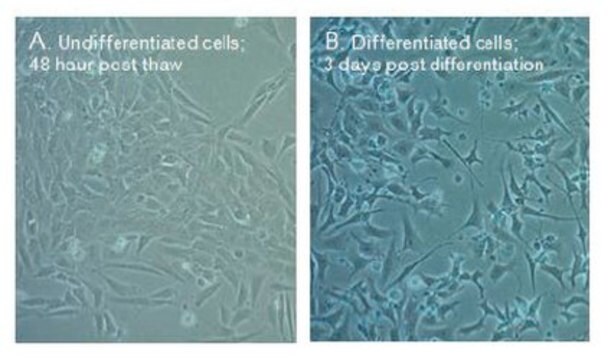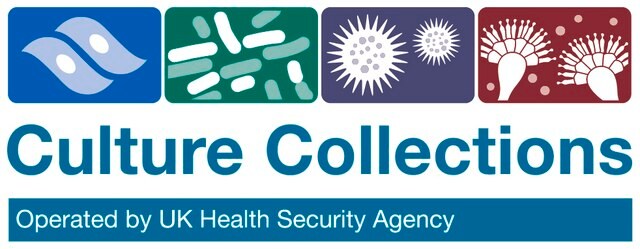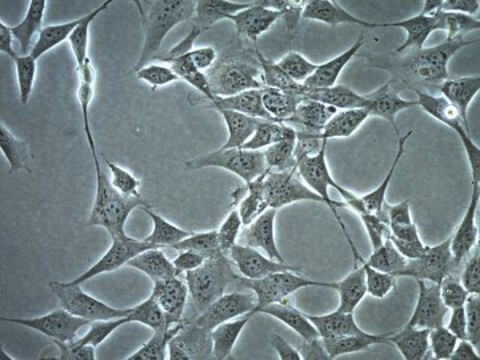SCC421
VCaP-EnzR Human Enzalutamide Resistant Prostate Cell Line
Human
Synonim(y):
Komórki raka prostaty oporne na enzalutamid
Zaloguj sięWyświetlanie cen organizacyjnych i kontraktowych
About This Item
Kod UNSPSC:
41106514
NACRES:
NA.81
Polecane produkty
Nazwa produktu
VCaP-EnzR Human Enzalutamide Resistant Prostate Cell Line,
pochodzenie biologiczne
human
opakowanie
vial of >1X10⁶ cells
producent / nazwa handlowa
Millipore
tryb wzrostu
N/A
metody
cell culture | mammalian: suitable
Warunki transportu
dry ice
temp. przechowywania
≤ − 140°C
Zastosowanie
Rak prostaty (PCA) jest najczęściej diagnozowanym nowotworem wśród mężczyzn w USA, z ponad 150 000 nowych przypadków rocznie. Około 6% z nich daje przerzuty, a wskaźnik 5-letniego przeżycia wynosi zaledwie 29%. Zmiany przerzutowe powstają najczęściej w kościach. Od lat czterdziestych XX wieku standardowym leczeniem zaawansowanego PCA jest kastracja chirurgiczna lub chemiczna ukierunkowana na oś sygnałową receptora androgenowego (AR). U większości leczonych pacjentów rozwija się jednak oporność i stają się oni niezależni od androgenów, co przyczynia się do progresji choroby i złego rokowania, określając krytyczną potrzebę zidentyfikowania nowych szlaków docelowych pośredniczących w oporności (1). Badania naukowe nad genezą nowotworów PCA i eksperymentalnymi terapiami zostały ograniczone do kilku systemów modelowych opartych na komórkach i zwierzętach.
Źródło:
Ksenoprzeszczepiona myszom SCID przed rozmnożeniem w hodowli komórkowej, macierzysta linia komórkowa PCA VCaP wywodzi się z przerzutowej zmiany kręgowej u opornego na hormonoterapię pacjenta z rakiem prostaty. Z powodzeniem hodowana przez ponad 50 pasaży in vitro, VCaP jest uważana za unieśmiertelnioną linię komórkową (2). VCaP-EnzR jest oporną na enzalutamid (EnzR) pochodną VCaP, opracowaną przez przedłużoną hodowlę in vitro z enzalutamidem, antagonistą AR drugiej generacji skutecznym w leczeniu opornego na kastrację raka prostaty. VcaP-EnzR jest cennym narzędziem badawczym do badania opornego na kastrację raka prostaty (3).
Poziom bezpieczeństwa biologicznego2
Komórki VCaP-EnzR zawierają mysiego retrowirusa ksenotropowego Bxv-1 i powinny być traktowane zgodnie z poziomem bezpieczeństwa biologicznego 2. Wiadomo, że macierzysta linia komórek raka prostaty VCaP wytwarza mysiego ksenotropowego retrowirusa Bxv-1, który prawdopodobnie został nabyty przez komórki podczas ich ksenotransplantacji u myszy.
Odniesienia:
1. Kelly SP et al. (2018) Przeszłe, obecne i przyszłe wskaźniki zachorowalności i obciążenia przerzutowym rakiem prostaty w Stanach Zjednoczonych. Eur Urol Focus 4(1):121-127.
2. Korenchuk S et al. (2001) VcaP, oparty na komórkach system modelowy ludzkiego raka prostaty. In Vivo 15(2):163-168.
3. Kregel S et al. (2016) Acquired resistance to the second-generation androgen receptor antagonist enzalutamide in castration-resistant prostate cancer. Oncotarget 7(18):26259-26274.
Źródło:
Ksenoprzeszczepiona myszom SCID przed rozmnożeniem w hodowli komórkowej, macierzysta linia komórkowa PCA VCaP wywodzi się z przerzutowej zmiany kręgowej u opornego na hormonoterapię pacjenta z rakiem prostaty. Z powodzeniem hodowana przez ponad 50 pasaży in vitro, VCaP jest uważana za unieśmiertelnioną linię komórkową (2). VCaP-EnzR jest oporną na enzalutamid (EnzR) pochodną VCaP, opracowaną przez przedłużoną hodowlę in vitro z enzalutamidem, antagonistą AR drugiej generacji skutecznym w leczeniu opornego na kastrację raka prostaty. VcaP-EnzR jest cennym narzędziem badawczym do badania opornego na kastrację raka prostaty (3).
Poziom bezpieczeństwa biologicznego2
Komórki VCaP-EnzR zawierają mysiego retrowirusa ksenotropowego Bxv-1 i powinny być traktowane zgodnie z poziomem bezpieczeństwa biologicznego 2. Wiadomo, że macierzysta linia komórek raka prostaty VCaP wytwarza mysiego ksenotropowego retrowirusa Bxv-1, który prawdopodobnie został nabyty przez komórki podczas ich ksenotransplantacji u myszy.
Odniesienia:
1. Kelly SP et al. (2018) Przeszłe, obecne i przyszłe wskaźniki zachorowalności i obciążenia przerzutowym rakiem prostaty w Stanach Zjednoczonych. Eur Urol Focus 4(1):121-127.
2. Korenchuk S et al. (2001) VcaP, oparty na komórkach system modelowy ludzkiego raka prostaty. In Vivo 15(2):163-168.
3. Kregel S et al. (2016) Acquired resistance to the second-generation androgen receptor antagonist enzalutamide in castration-resistant prostate cancer. Oncotarget 7(18):26259-26274.
Cechy i korzyści
Linia komórkowa VCaP-EnzR Human Enzalutamide Resistant Prostate Cell Line jest cennym modelem badawczym do badania opornego na kastrację raka prostaty.
Przechowywanie i stabilność
Przechowywać w ciekłym azocie. Komórki mogą być hodowane przez co najmniej 10 pasaży po wstępnym rozmrożeniu bez znaczącego wpływu na ekspresję markerów komórkowych i ich funkcjonalność.
Inne uwagi
Ten produkt jest przeznaczony do sprzedaży i sprzedawany wyłącznie instytucjom akademickim do wewnętrznego użytku akademickiego zgodnie z warunkami "Umowy o użytkowaniu akademickim", jak wyszczególniono w dokumentacji produktu.
Oświadczenie o zrzeczeniu się odpowiedzialności
O ile nie określono inaczej w naszym katalogu lub innej dokumentacji firmy dołączonej do produktu(-ów), nasze produkty są przeznaczone wyłącznie do użytku badawczego i nie mogą być wykorzystywane do żadnych innych celów, w tym między innymi do nieautoryzowanych zastosowań komercyjnych, zastosowań diagnostycznych in vitro, zastosowań terapeutycznych ex vivo lub in vivo lub jakiegokolwiek rodzaju konsumpcji lub zastosowania u ludzi lub zwierząt.
WYŁĄCZNIE DO CELÓW BADAWCZYCH. Ten produkt podlega regulacjom prawnym we Francji, jeśli jest przeznaczony do celów naukowych, w tym do importu i eksportu (art. L 1211-1 ust. 2 kodeksu zdrowia publicznego). Nabywca (tj. użytkownik końcowy) jest zobowiązany do uzyskania zezwolenia na import od francuskiego Ministerstwa Badań Naukowych, o którym mowa w artykule L1245-5-1 II Kodeksu Zdrowia Publicznego. Zamawiając ten produkt, użytkownik potwierdza, że uzyskał odpowiednie zezwolenie na import.
Ta strona może zawierać tekst przetłumaczony maszynowo.
Kod klasy składowania
10 - Combustible liquids
Klasa zagrożenia wodnego (WGK)
WGK 2
Temperatura zapłonu (°F)
Not applicable
Temperatura zapłonu (°C)
Not applicable
Certyfikaty analizy (CoA)
Poszukaj Certyfikaty analizy (CoA), wpisując numer partii/serii produktów. Numery serii i partii można znaleźć na etykiecie produktu po słowach „seria” lub „partia”.
Masz już ten produkt?
Dokumenty związane z niedawno zakupionymi produktami zostały zamieszczone w Bibliotece dokumentów.
Nasz zespół naukowców ma doświadczenie we wszystkich obszarach badań, w tym w naukach przyrodniczych, materiałoznawstwie, syntezie chemicznej, chromatografii, analityce i wielu innych dziedzinach.
Skontaktuj się z zespołem ds. pomocy technicznej